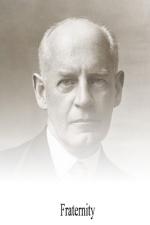“Well, good-night!” said Hilary hastily. “You must run off....”
That same evening, driving with his wife back from a long, dull dinner, Hilary began:
“I’ve something to say to you.”
An ironic “Yes?” came from the other corner of the cab.
“There is some trouble with the little model.”
“Really!”
“This man Hughs has become infatuated with her. He has even said, I believe, that he was coming to see you.”
“What about?”
“Me.”
“And what is he going to say about you?”
“I don’t know; some vulgar gossip—nothing true.”
There was a silence, and in the darkness Hilary moistened his dry lips.
Bianca spoke: “May I ask how you knew of this?”
“Cecilia told me.”
A curious noise, like a little strangled laugh, fell on Hilary’s ears.
“I am very sorry,” he muttered.
Presently Bianca said:
“It was good of you to tell me, considering that we go our own ways. What made you?”
“I thought it right.”
“And—of course, the man might have come to me!”
“That you need not have said.”
“One does not always say what one ought.”
“I have made the child a present of some clothes which she badly needed. So far as I know, that’s all I’ve done!”
“Of course!”
This wonderful “of course” acted on Hilary like a tonic. He said dryly:
“What do you wish me to do?”
“I?” No gust of the east wind, making the young leaves curl and shiver, the gas jets flare and die down in their lamps, could so have nipped the flower of amity. Through Hilary’s mind flashed Stephen’s almost imploring words: “Oh, I wouldn’t go to her! Women are so funny!”
He looked round. A blue gauze scarf was wrapped over his wife’s dark head. There, in her corner, as far away from him as she could get, she was smiling. For a moment Hilary had the sensation of being stiffed by fold on fold of that blue gauze scarf, as if he were doomed to drive for ever, suffocated, by the side of this woman who had killed his love for her.
“You will do what you like, of course,” she said suddenly.
A desire to laugh seized Hilary. “What do you wish me to do?” “You will do what you like, of course!” Could civilised restraint and tolerance go further?
“B.” he said, with an effort, “the wife is jealous. We put the girl into that house—we ought to get her out.”
Blanca’s reply came slowly.
“From the first,” she said, “the girl has been your property; do what you like with her. I shall not meddle.”
“I am not in the habit of regarding people as my property.”
“No need to tell me that—I have known you twenty years.”
Doors sometimes slam in the minds of the mildest and most restrained of men.
“Oh, very well! I have told you; you can see Hughs when he comes—or not, as you like.”




